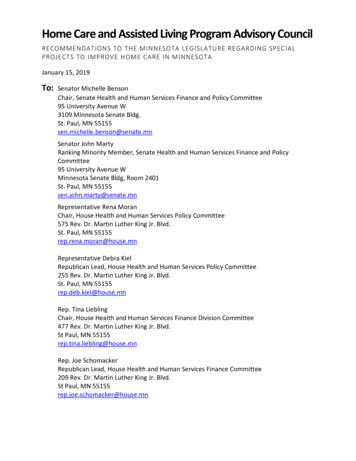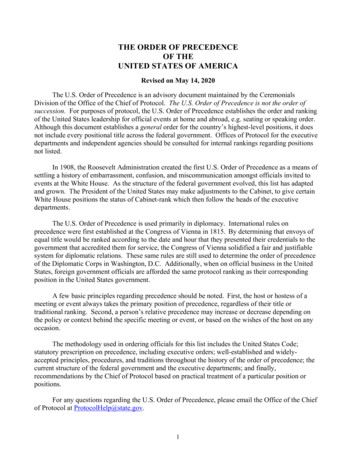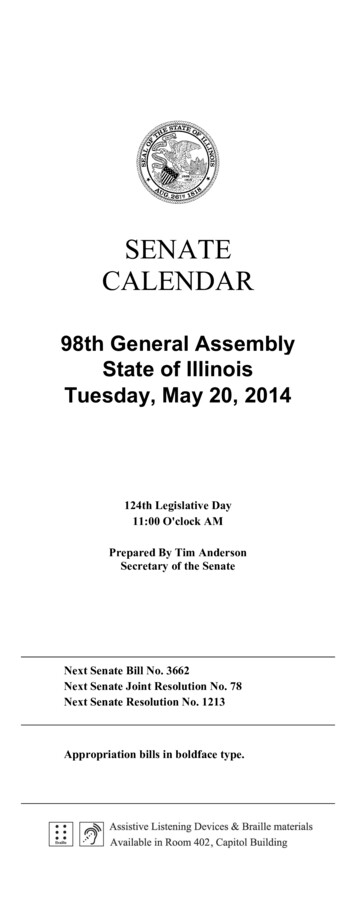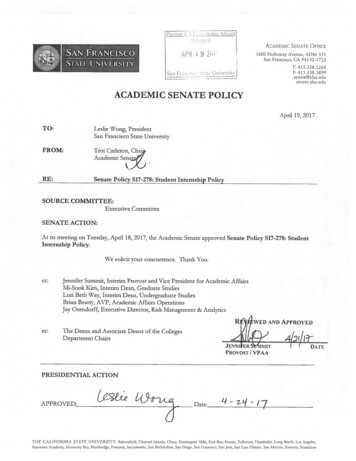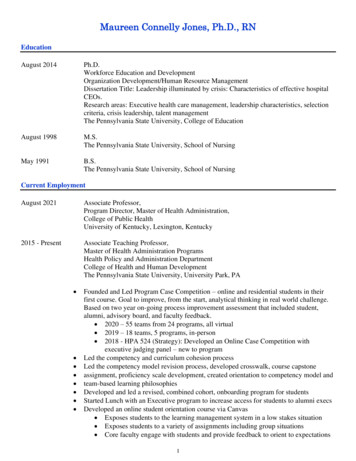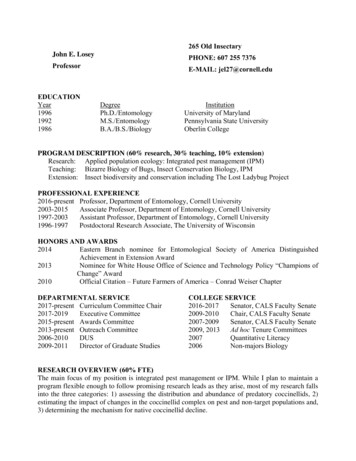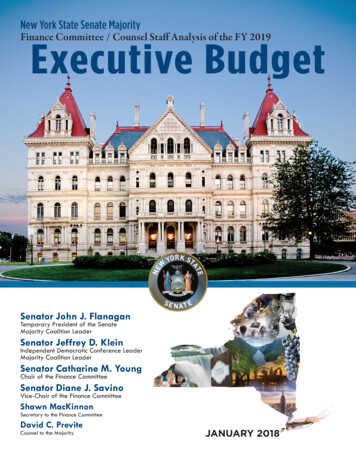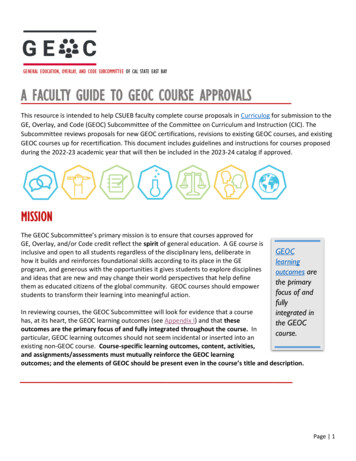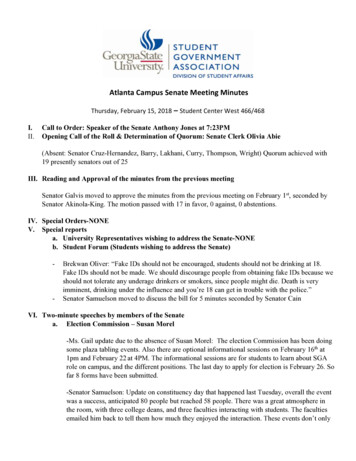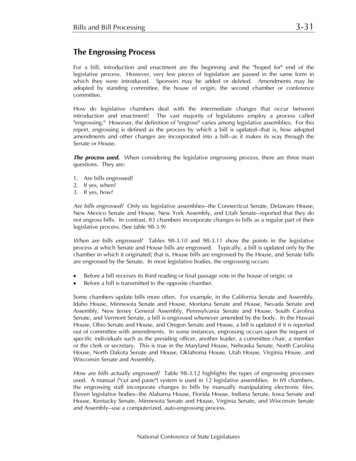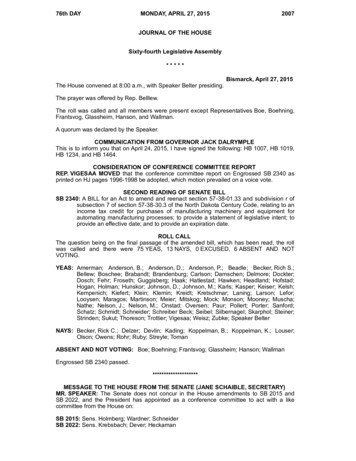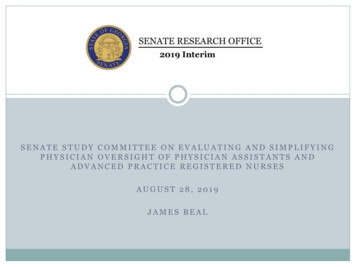
Transcription
SENATE STUDY COMMITTEE ON EVALUATING AND SIMPLIFYINGPHYSICIAN OVERSIGHT OF PHYSICIAN ASSISTANTS ANDADVANCED PRACTICE REGISTERED NURSESAUGUST 28, 2019JAMES BEAL
Physician Assistant Regulation Basics Licensed by the Georgia Composite Medical Board 5,297 licensed PAs as of August 15, 2019 Physician supervision is determined at practice level Statute limits physician’s supervision to four PAs maximum; two at any onetime; with exceptions Prescriptive authority provided by statute allows PAs toorder controlled substances III – V and dangerous drugs,as dictated by an approved job description PA’s scope of practice is limited to approved scope ofsupervising physician’s practice as dictated in anapproved job description2
PA SupervisionSupervision determinedby law/regulation State law or board rulesprovide supervisionrequirementsSupervision determinedat practice level A written job description orcollaborative agreementbetween physician and PA3
PA Supervision Continued A primary supervising physician shall not have morethan four PAs to supervise, and supervise not more thantwo at any one time, except: A primary supervising physician may supervise up to four PAs at anyone time in a group practice with other supervising physicians. An alternate supervising physician may also supervise upto four PAs in an institutional setting (eg. hospital orclinic), when on call for a primary supervising physician,or when otherwise approved by GCMB as an alternate.O.C.G.A. § 43-34-103(b)4
PA Prescriptive AuthorityGeorgia allows PAs to prescribeschedule III, IV, and Vcontrolled substances.44 states and D.C. allow PAs toprescribe schedule II, III, IV,and V controlled substances.Prescriptive authority allowedfor drugs only if a physician hasdelegated as provided in thePA’s job description.PA may order refills for up to 12months. For scheduled drugs,refills up to six months.5
PA Scope of PracticeGeorgia’s scope of practice lawsare based on the supervisingphysician’s delegation, limited toonly the physician’s scope andmust be approved by GCMB(same as South Carolina,Alabama, etc.).States such as Florida, Louisiana,Texas, etc. do not require medicalboard/regulator approval.6
PA Education, License Requirements PA students attend formal physician assistant education programsapproved by GCMB Usually six years of education – four years undergraduate/bachelorsand two years in PA school Must pass the Physician Assistant National Certifying Exam (“PANCE”)administered by the National Commission on Certification of PhysicianAssistants Continuing education requirements 40 hours biennially, 10 hours of which are in the physician’s specialty3 hours in pharmaceuticals for PAs with prescriptive authority Citizenship, legal permanent resident, or qualified alien statusrequirement Good moral character references by two physicians, may not bephysician seeking to use the PA (Board regulation)7
Advance Practice Registered Nurse Regulation Basics Licensed by the Board of Nursing as a registered nurse,authorized as an APRN by the Board 15,422 authorized APRNs Of these, 12,459 are nurse practitioners Georgia requires a written protocol between a supervisingphysician and APRN Board of Nursing regulations limit physician’s supervision to four APRNs, withexceptions Prescribing authority is allowed pursuant to a written protocoland if authorized by the GCMB APRNs: Nurse-midwife; nurse practitioners; certifiedregistered nurse anesthetist, clinical nurse specialistpsychiatric/mental health; clinical nurse specialist8
APRN Practice Authority26 states require aphysician relationship.24 states allow APRNindependent practice.9
APRN Supervision A delegating physician may not enter into a nurse protocolagreement with more than four APRNs at any one time,except when the APRN is practicing in: A licensed hospital;A college or university;DPH, county board of health, or CSBs;A free health clinic, or birthing center;A non-profit entity primarily serving uninsured or indigent Medicaid,Medicare patients;FQHCs or other federally-authorized, -funded entity;Local boards of education with school nurse programs;Health maintenance organization; orAn EMS system, under local authority, with a full time physician medicaldirector.O.C.G.A. § 43-34-25(g)10
APRN Supervision Continued A supervising physician may not enter into a nurseprotocol agreement with more than eight APRNs, andsupervise no more than four at any one time, at locationswhich: Maintain evidence-based clinical practice guidelines;Accredited by a nationally recognized organization (eg. JointCommission);Require the physician maintain a record of review of at least 10percent of the APRN’s medical records;Require physicians and APRNs to participate in and maintainquarterly clinical collaboration meetings; andRequire the delegating physician’s contact information be providedto a patient’s PCP.O.C.G.A. § 43-34-25(g.1)11
APRN Supervision Continued A supervising physician may not enter into a nurseprotocol agreement with more than eight APRNs at anyone time, or supervise more than four at any one time, inany EMS system operated by or on behalf of a localauthority with a full-time medical director.O.C.G.A. § 43-34-25(g.2)12
APRN Prescriptive AuthorityAll states D.C. allow APRNs toprescribe.Georgia allows APRNs toprescribe schedule III, IV, and Vcontrolled substances pursuantto a written protocol.45 states allow APRNs toprescribe schedule II, III, IV, andV controlled substances.13
APRN License, Education Requirements APRN students attend Board of Nursing-approved masters/graduate programsUsually six years of education – four years undergraduate/nursingprogram, two years in an approved advanced programMust be certified by a national board approved by the Board of NursingSubmit required documents as an RN, including passage of the NCLEXRequired continuing education for renewal, but multiple options Can be through continuing education classes, maintaining certification by a national board,completing a Board-recognized academic program, verification of competency from a facilitywith 500 hours practiced, or any other Board-approved methods.14
2019 Georgia Legislation SB 168 – Allows APRNs working in an EMS system overseen by aphysician medical director to order up to a 14 day supply of drugs inemergency situations, excluding schedule II substances andbenzodiazepines; prohibits APRNs from ordering radiographicimaging, diagnostic studies, and medical devices; and requires referralof the patient to a physician, dentist, or FQHC (Passed – Effective April25, 2019) HB 409 – Proposes to remove “life-threatening situation” as aprerequisite for APRNs ordering radiographic imaging tests; raises thenumber of APRNs a physician may supervise (In House Committee) SB 109 – Removes “life-threatening situation” as a prerequisite forAPRNs licensed for at least five years to order radiographic imagingtests (Tabled)15
Physician Assistant Regulation Basics Licensed by the Georgia Composite Medical Board 5,297 licensed PAs as of August 15, 2019 Physician supervision is determined at practice level Statute limits physician'ssupervision to four PAs maximum; two at any one time; with exceptions Prescriptive authority provided by statute allows PAs to order controlled substances III -V and dangerous drugs,
